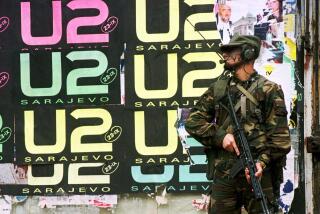U2’s Daring Descent Into Darkness
- Share via
U2 still hasn’t found what it’s looking for--and that artistic restlessness is a key reason this Irish rock band continues to be so involving.
In its first album in three years, the quartet sets aside the uplifting anthems of the Grammy-winning “The Joshua Tree” and the rock history exploration of “Rattle and Hum” to reflect on issues that seem almost subdued in a year in which rock has been obsessed with anger and rage. The concerns: troubled relationships, self-worth and identity.
While the arty, guitar-driven textures are among the band’s most confident and vigorous ever, Bono’s lyrics are introspective and self-questioning. He may have expressed disillusionment and doubts on earlier albums, but the overall message was always uplifting, suggesting a sense of destiny and hope.
It was rock on a grand scale, and the music established U2 in the ‘80s as the first band in years to offer the ambition, craft and leadership that characterized the Beatles, the Who and other great rock bands of the ‘60s.
After achieving massive popularity and acclaim for those tales of light, U2 now tries to touch us with examinations of the darkness.
It’s a daring move because U2’s appeal was due in part to its being one of the few contemporary voices in mainstream rock that could speak about inspirational matters with the eloquence and insight of the Bob Dylan, Bruce Springsteen and Van Morrison tradition. Moving into the more populated rock world of desolate or disheartened souls, the band loses some of its individuality.
The themes may be new to U2, but they have been widely documented, from the Velvet Underground and Leonard Cohen to a whole generation of young bands. Yet it makes perfect sense for Bono and compatriots (guitarist the Edge, bassist Adam Clayton and drummer Larry Mullen Jr.) to move into the new territory.
After struggling for years with issues of social responsibility and conscience, Bono would naturally be intrigued by the more concrete matters of the heart. The new songs deal with disappointment and deceit--how love, yes, can take you higher and also tear you apart. But most of the songs too can be seen as questioning individual doubts and desires.
Despite its frequently exhilarating and sensual textures, “Achtung Baby” is a difficult album--one that seems the result of considerable soul-searching lyrically. At one point, Bono even seems to question his motives and obsessions as a performer:
Every artist is a cannibal
Every poet is a thief
All kill their inspiration
And sing about the grief
The jarring brace of sound at the start of the album also makes it apparent quickly that we are in new musical territory. You can’t tell for a few seconds whether U2 has joined the heavy-metal camp or if it has been commissioned to write the soundtrack for a horror film.
When Bono begins singing, special effects make him sound as if he is speaking to us while emerging from a deep, troubled sleep and preparing for nightmares of the real world. The words, however, suggest vitality and a trace of humor:
I’m ready
Ready for the gridlock . . .
Ready for the shuffle
Ready for the deal
Ready to let go
Of the steering wheel
From there, the album leads us on a dimly lit journey through the elements of what seems almost to be the dream itself. Producer Daniel Lanois--assisted on some tracks by Brian Eno or Steve Lillywhite or both--remains a master of rock atmosphere and punctuation.
Among the trip’s high points: the disillusioned “One.” Sample lines:
You say
Love is a temple
Love the higher law
You ask me to enter
But then you make me crawl
And I can’t be holding on
To what you got
When all you got is hurt
Rather than the peaceful desert scene on the cover of “The Joshua Tree,” U2 is shown this time on the cover in a variety of images reflecting the hustle--and reality--of the city. The idea is that the band with its head in the heavens is back with its feet on Earth.
There is a transitional feel to parts of the album that makes it resemble 1984’s experimental “The Unforgettable Fire” rather than the more assured vision of “The Joshua Tree.” Yet some tracks--including the pulsating and accusatory “So Cruel” and the anxious “Until the End of the World”--clearly rank with the finest moments in U2’s body of work. The vision remains.
* * * * U2 “Achtung Baby”
Island
More to Read
The biggest entertainment stories
Get our big stories about Hollywood, film, television, music, arts, culture and more right in your inbox as soon as they publish.
You may occasionally receive promotional content from the Los Angeles Times.










